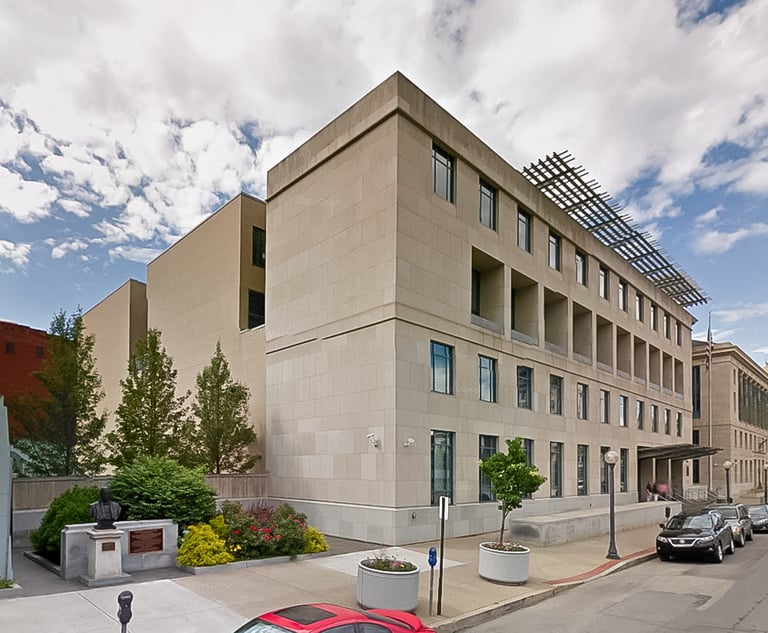Landmark 'Tooey' Decision Doesn't Save Wrongful Death Case, Appeals Court Rules
An appellant's reliance on a Pennsylvania Supreme Court decision clarifying the scope of the Workers' Compensation Act was misplaced in the wrongful death context, the state Superior Court has ruled.
November 21, 2018 at 12:54 PM
3 minute read
 Photo credit: Bigstock
Photo credit: Bigstock
An appellant's reliance on a Pennsylvania Supreme Court decision clarifying the scope of the Workers' Compensation Act was misplaced in the wrongful death context, the state Superior Court has ruled.
In Riley v. Armstrong World Industries, a three-judge panel consisting of Judges Anne Lazarus, Judith Ference Olson and John Musmanno ruled that the Pennsylvania Supreme Court's 2013 decision in Tooey v. AK Steel did not give more time for plaintiff Sherry Riley to file her wrongful death claim.
Riley, the widow of Jeffrey Riley, filed her lawsuit against the defendant after her husband died from multiple myeloma, caused by exposure to toxic chemicals manufactured by Brenntag at the Armstrong facility where he worked. Brenntag was previously dismissed from the case.
The case was dismissed after preliminary objections by the defendants were sustained. The defendants argued that the claim was time-barred because the applicable statute of limitations had run. The court held that the statute began to run when Jeffrey Riley died on Nov. 1, 2012—33 months before Riley filed her lawsuit.
On appeal, Riley argued that the statute of limitations did not start running until the Supreme Court's Tooey ruling came down.
“Tooey clarified the scope of the Workers' Compensation Act. Our Supreme Court held that the Workers' Compensation Act's exclusivity provision does not cover an occupational disease-based disability that manifests over 300 weeks after the last occupational exposure,” Olson wrote in the court's opinion. “Contrary to appellant's arguments, Tooey did not create a new cause of action nor did the Workers' Compensation Act previously bar appellant's claims. Instead, our Supreme Court clarified the scope of the Workers' Compensation Act's exclusivity provision, which had not changed. Moreover, Tooey did not overturn prior decisions of our Supreme Court. Instead, it overturned prior decisions of this court.”
Olson added, “Appellant could have filed her lawsuit within two years of Riley's death and argued that the Workers' Compensation Act's exclusivity provision did not bar her claims. Many plaintiffs throughout our commonwealth, including Tooey, filed such suits and argued that this court's prior interpretation of the Workers' Compensation Act was incorrect. Appellant failed to do so, and our Supreme Court's Tooey decision did not extend the statute of limitations for her survival and wrongful death claims.”
Todd Mosser of Mosser Legal in Philadelphia represents Riley and did not return a call seeking comment.
George C. Werner of Barley Snyder in Lancaster represents Armstrong and also did not return a call seeking comment.
(Copies of the five-page opinion in Riley v. Armstrong World Industries, PICS No. 18-1428, are available at http://at.law.com/PICS.)
This content has been archived. It is available through our partners, LexisNexis® and Bloomberg Law.
To view this content, please continue to their sites.
Not a Lexis Subscriber?
Subscribe Now
Not a Bloomberg Law Subscriber?
Subscribe Now
NOT FOR REPRINT
© 2025 ALM Global, LLC, All Rights Reserved. Request academic re-use from www.copyright.com. All other uses, submit a request to [email protected]. For more information visit Asset & Logo Licensing.
You Might Like
View All
Middle District of Pennsylvania's U.S. Attorney Announces Resignation
2 minute read
High Court Revives Kleinbard's Bid to Collect $70K in Legal Fees From Lancaster DA
4 minute read
Immunity for Mental Health Care and Coverage for CBD: What's on the Pa. High Court's November Calendar
5 minute read
Slip-and-Fall Suit Cleared to Proceed Against Kalahari Indoor Waterpark
3 minute readTrending Stories
- 1Uber Files RICO Suit Against Plaintiff-Side Firms Alleging Fraudulent Injury Claims
- 2The Law Firm Disrupted: Scrutinizing the Elephant More Than the Mouse
- 3Inherent Diminished Value Damages Unavailable to 3rd-Party Claimants, Court Says
- 4Pa. Defense Firm Sued by Client Over Ex-Eagles Player's $43.5M Med Mal Win
- 5Losses Mount at Morris Manning, but Departing Ex-Chair Stays Bullish About His Old Firm's Future
Who Got The Work
J. Brugh Lower of Gibbons has entered an appearance for industrial equipment supplier Devco Corporation in a pending trademark infringement lawsuit. The suit, accusing the defendant of selling knock-off Graco products, was filed Dec. 18 in New Jersey District Court by Rivkin Radler on behalf of Graco Inc. and Graco Minnesota. The case, assigned to U.S. District Judge Zahid N. Quraishi, is 3:24-cv-11294, Graco Inc. et al v. Devco Corporation.
Who Got The Work
Rebecca Maller-Stein and Kent A. Yalowitz of Arnold & Porter Kaye Scholer have entered their appearances for Hanaco Venture Capital and its executives, Lior Prosor and David Frankel, in a pending securities lawsuit. The action, filed on Dec. 24 in New York Southern District Court by Zell, Aron & Co. on behalf of Goldeneye Advisors, accuses the defendants of negligently and fraudulently managing the plaintiff's $1 million investment. The case, assigned to U.S. District Judge Vernon S. Broderick, is 1:24-cv-09918, Goldeneye Advisors, LLC v. Hanaco Venture Capital, Ltd. et al.
Who Got The Work
Attorneys from A&O Shearman has stepped in as defense counsel for Toronto-Dominion Bank and other defendants in a pending securities class action. The suit, filed Dec. 11 in New York Southern District Court by Bleichmar Fonti & Auld, accuses the defendants of concealing the bank's 'pervasive' deficiencies in regards to its compliance with the Bank Secrecy Act and the quality of its anti-money laundering controls. The case, assigned to U.S. District Judge Arun Subramanian, is 1:24-cv-09445, Gonzalez v. The Toronto-Dominion Bank et al.
Who Got The Work
Crown Castle International, a Pennsylvania company providing shared communications infrastructure, has turned to Luke D. Wolf of Gordon Rees Scully Mansukhani to fend off a pending breach-of-contract lawsuit. The court action, filed Nov. 25 in Michigan Eastern District Court by Hooper Hathaway PC on behalf of The Town Residences LLC, accuses Crown Castle of failing to transfer approximately $30,000 in utility payments from T-Mobile in breach of a roof-top lease and assignment agreement. The case, assigned to U.S. District Judge Susan K. Declercq, is 2:24-cv-13131, The Town Residences LLC v. T-Mobile US, Inc. et al.
Who Got The Work
Wilfred P. Coronato and Daniel M. Schwartz of McCarter & English have stepped in as defense counsel to Electrolux Home Products Inc. in a pending product liability lawsuit. The court action, filed Nov. 26 in New York Eastern District Court by Poulos Lopiccolo PC and Nagel Rice LLP on behalf of David Stern, alleges that the defendant's refrigerators’ drawers and shelving repeatedly break and fall apart within months after purchase. The case, assigned to U.S. District Judge Joan M. Azrack, is 2:24-cv-08204, Stern v. Electrolux Home Products, Inc.
Featured Firms
Law Offices of Gary Martin Hays & Associates, P.C.
(470) 294-1674
Law Offices of Mark E. Salomone
(857) 444-6468
Smith & Hassler
(713) 739-1250





